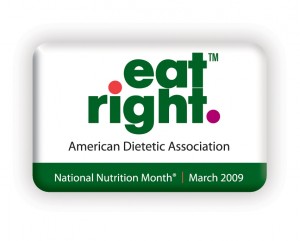 National Nutrition Month® is the annual nutrition campaign held in March to provide nutrition education and information. This campaign was created by the American Dietetic Association (ADA), in which they strives to improve Americans’ eating habits by stressing the importance of making healthy food choices, developing nutritious eating habits, and helping to incorporate physical activity to your every day life.
National Nutrition Month® is the annual nutrition campaign held in March to provide nutrition education and information. This campaign was created by the American Dietetic Association (ADA), in which they strives to improve Americans’ eating habits by stressing the importance of making healthy food choices, developing nutritious eating habits, and helping to incorporate physical activity to your every day life.
This year’s theme is simple and to the point: “Eat Right,” and the ADA website provides us with the 2024 Key Messages to help make sure we “Eat Right.”
Eating Right Messages for Everyone
Eating right and staying fit are important at every age! By making healthy food choices and being physically active every day you will help yourself live a more energized and healthier life (not to mention, feeling great about yourself!). Don’t get stressed and feel like eating right is complicated, start with these recommendations from the Dietary Guidelines for Americans:
- Emphasizes fruit, vegetables, whole grains and low-fat or fat-free milk and milk products
- Include lean meats, poultry, fish, beans, eggs and nuts
- Consume low amounts of saturated fats, trans fats, cholesterol, salt (sodium) and added sugars
- Try focusing on nutrient-rich foods rather than “good” or “bad” foods. Nutrient-dense means that the majority of your food choices should be packed with vitamins, minerals, fiber and other nutrients, while being lower in calories.
- Making smart food choices can help you stay healthy, manage your weight and be physically active.
Focus on Variety
- Eat a variety of foods from all the food groups to get the nutrients your body needs.
- Fruits and vegetables can be fresh, frozen or canned (be careful of eating veggies frozen in cream sauces because this adds a lot of fat, calories, and sodium to a normally healthy veggie).
- Include more dark green vegetables (i.e. leafy greens and broccoli) and orange vegetables (like carrots and sweet potatoes); because in terms of nutrient-dense foods these two are powerhouses!
- Vary your protein choices with more fish, beans and peas.
- Eat at least three ounces of whole grain cereals, breads, crackers, rice or pasta every day (never exclude your carbs! Just choose whole-grain/whole-wheat products).
- Look for foods that are low in saturated fats, trans fats and cholesterol.
- Most of the fats you eat should be monounsaturated (olive oil, avocado, nuts, seeds) and polyunsaturated fats (vegetable oils like safflower, corn, or nuts and seeds).
- Remember to always check the nutrition facts panel on food labels!

